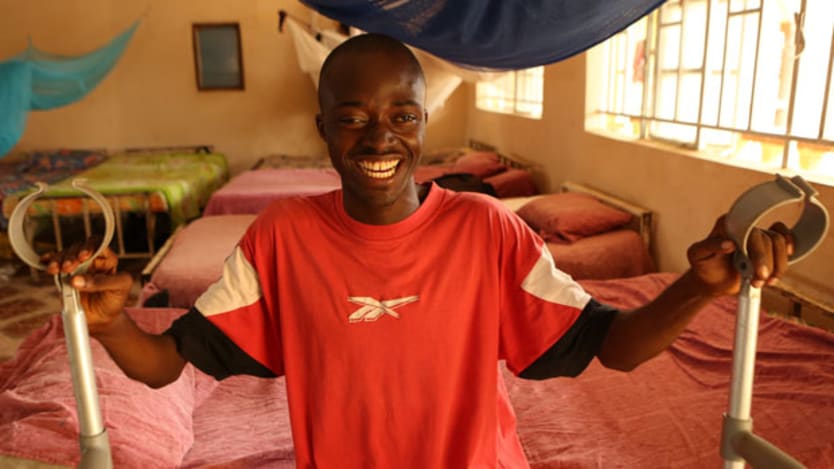
The International Development Committee published last April several recommendations for the U.K. Department for International Development to better address disability in its programs — but what exactly do disabled people's organizations want the British aid agency to focus on as it readies its response next week?
So far, DfID has been mum on its response to the IDC report. NGOs like Sightsavers are eager to hear the agency’s feedback — which is already with the IDC awaiting formal parliamentary procedure, but basically outlines whether DfID agrees, partially agrees or disagrees with the committee’s suggestions. DfID’s response is expected to come out June 23, two weeks behind schedule.
Disabled people’s organizations, however, hope the agency will respond favorably to the recommendations, or at least to these five issues:
• Develop a disability strategy that would help identify DfID's vision on disability. At the same time, provide DfID staff and offices clear direction on what the agency wants to achieve, along with specific objectives and resource allocations.
• Ensure people with disabilities are "fully" involved in the design and delivery of DfID programs. One way is through engaging group that defend the rights of disabled people.
• Create an approach that can disaggregate results of its development work by disability in its annual reports, project reviews and logframes, as well as targets in its results framework, the same way it does for gender. This will help DfID and organizations understand and ensure that British aid is reaching people with disabilities, as well as see whether it is achieving the desired results, said Dominic Haslam, director of policy and program strategies at Sightsavers, who argued: “The only way you know if you didn't leave anybody behind is if you know who everybody is, where they are and know what they’re accessing and what they’re not.”
• Embed disability in DfID's "culture" by hiring a senior, internal champion for disability, and also ensure staff won't leave people with disabilities behind as they implement DfID projects. In the IDC report, some offices have failed to follow guidance notes on disability, citing competing demands.
• Require organizations and partners receiving DfID funding to demonstrate in their applications how people with disabilities are participating in the program, from project design to evaluation. As part of this, they also are asking DfID to include a criteria on disability in its 2015 Multilateral Aid Review.
According to the IDC report, DfID has initially expressed reluctance to take up some of the suggestions, like creating a separate disability strategy. Haslam told Devex this is understandable given the additional paperwork, follow up, monitoring and other tasks it will require. But he insists this is crucial if the aid agency is serious about “leaving no one behind,” as British Prime Minister and Co-Chair of the U.N. High-Level Panel on the Post-2015 Development Agenda David Cameron himself has said on more than one occasion.
This issue was underscored last week by an official from a disabled people's organization in the Philippines during Devex's first Partnerships Forum in Manila. Joyce Garcia from Tahanang Walang Hagdan, a local NGO, said that the needs of disabled people should be included specifically in donor strategies.
Some donors, she argued, think that "implementing organizations should be the one to think about [including accessibility for persons with disabilities in their projects], but I think putting that as a policy you'd be able to understand the importance of persons with disability.”
“[They] often say it's there already, it's embedded in the laws,” Garcia said. “But we often find out we are always crossed out.”
Despite all this, the fact that disability is receiving such political scrutiny and attention now is already a huge leap from previous years and should in no way be underestimated, Haslam said.
Over the last decade, given the aid community's focus on issues set out in the Millennium Development Goals and donors' placed importance on impact, organizations felt disability had been sidelined from the development agenda, with some groups struggling to secure funding from DfID.
Time will tell whether the British aid agency will heed these calls or not, but Haslam underscored the importance for DfID to come out with a positive, ambitious response to the committee report now.
“If the opportunity presented by the select committee report is missed, it could be years before disability and development will receive this level of political attention again – leaving another generation excluded,” he told Devex. “The committee’s report offers hope and promise to people with disabilities around the world who do not currently have a voice in or benefit from U.K. aid.”
Read more development aid news online, and subscribe to The Development Newswire to receive top international development headlines from the world’s leading donors, news sources and opinion leaders — emailed to you FREE every business day.
Read more on inclusive development:
• Instigating change for disability in development
• Why post-2015 indicators can help people with disability
• Closing the data gap for inequality








